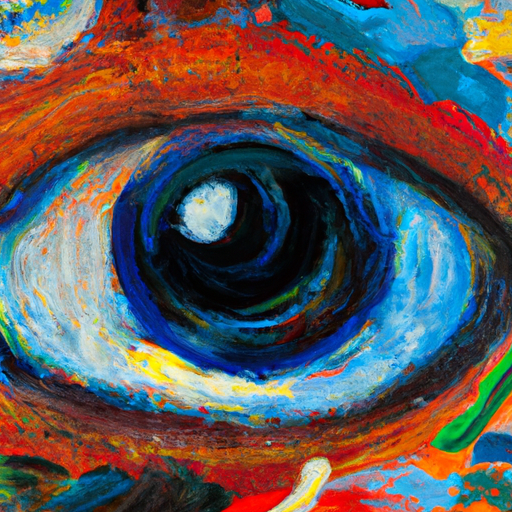Have you ever noticed small spots floating in your field of vision? These spots, also known as floaters, can be a common occurrence for many individuals. While they are often harmless, understanding the symptoms, causes, and potential treatments for spots in the eyes can provide valuable insights into maintaining good eye health. In this article, we will explore the various aspects of spots in the eyes, including their common symptoms and causes, expert insights on diagnosis and treatment approaches, as well as tips for managing and preventing future occurrences. Whether you have experienced these spots before or are curious to learn more, read on to gain a comprehensive understanding of spots in the eyes and how to effectively deal with them.
1. "Understanding Spots in the Eyes: Common Symptoms and Causes"
Spots in the eyes, also known as floaters, are a common occurrence that many people experience at some point in their lives. These spots can appear as tiny specks, cobwebs, or even dark threads that seem to float across our field of vision. While they may seem alarming at first, most spots in the eyes are harmless and do not require immediate medical attention.
One of the most common symptoms of spots in the eyes is the perception of small, moving objects in the visual field. These spots tend to drift and move as we shift our gaze, often following the movement of our eyes. They are most noticeable when looking at a plain, bright background, such as a clear sky or a white wall. However, they may also be visible in other situations, such as while reading or using electronic screens.
The exact cause of spots in the eyes can vary, but they typically occur due to changes in the vitreous humor, a gel-like substance that fills the space between the lens and the retina. As we age, the vitreous humor tends to shrink and become more liquid, leading to the formation of small clumps or strands. The shadows cast by these clumps or strands onto the retina are what we perceive as spots in our vision.
Other causes of spots in the eyes can include eye injuries, inflammation, or bleeding in the eye. In some cases, certain medical conditions such as diabetic retinopathy or retinal detachment can also contribute to the appearance of spots. If you suddenly notice a significant increase in the number of spots or experience other accompanying symptoms such as
2. "Diagnosing and Treating Spots in the Eyes: Expert Insights and Approaches"
When it comes to diagnosing and treating spots in the eyes, it is essential to consult with an eye care professional who can provide expert insights and approaches. These specialists, such as ophthalmologists or optometrists, possess the necessary knowledge and experience to accurately diagnose the cause of spots in the eyes and recommend appropriate treatments.
Diagnosing spots in the eyes typically involves a comprehensive eye examination. During this examination, the eye care professional will ask about the patient's medical history and any symptoms they may be experiencing. They will also perform various tests to assess the overall health of the eyes and identify any underlying conditions.
One of the primary tests used in diagnosing spots in the eyes is a dilated eye exam. In this procedure, the eye care professional will administer eye drops to enlarge the pupils, allowing for a more detailed examination of the back of the eye. By examining the retina and optic nerve, the specialist can identify any abnormalities or signs of damage that may be causing the spots.
Additionally, imaging tests such as optical coherence tomography (OCT) may be used to provide a cross-sectional view of the retina and detect any structural abnormalities or fluid accumulation. Fluorescein angiography, another imaging technique, can help identify any issues with blood vessels in the eye that may be contributing to the spots.
Once a diagnosis is made, the appropriate treatment plan can be determined. The treatment for spots in the eyes largely depends on the underlying cause. For instance, if spots are caused by age-related macular degeneration, a condition characterized by the deterioration of the central part of the retina
3. "Living with Spots in the Eyes: Tips for Managing and Preventing Future Occurrences"
Living with spots in the eyes can be a frustrating experience, but there are ways to manage and prevent future occurrences. These tips can help individuals cope with the presence of spots and take proactive steps to minimize their impact on daily life.
1. Regular Eye Exams: Scheduling regular eye exams with an ophthalmologist or optometrist is crucial for managing spots in the eyes. These professionals can conduct comprehensive evaluations to determine the cause of the spots and recommend appropriate treatment options. Regular check-ups also help identify any underlying conditions that may be contributing to the appearance of spots, such as macular degeneration or diabetic retinopathy.
2. Maintain Overall Eye Health: Taking care of your eyes is essential for managing spots. This includes practicing good hygiene, such as avoiding rubbing your eyes and washing your hands before touching your face. Additionally, protecting your eyes from harmful UV rays by wearing sunglasses and using protective eyewear when necessary can help prevent further damage to the eyes.
3. Manage Underlying Health Conditions: Some spots in the eyes may be linked to underlying health conditions, such as diabetes or high blood pressure. It is crucial to work closely with a healthcare professional to manage these conditions effectively. By keeping these conditions under control, individuals can reduce the risk of developing new spots or worsening existing ones.
4. Healthy Lifestyle Choices: Making healthy lifestyle choices can have a positive impact on eye health. Eating a balanced diet rich in nutrients, particularly those beneficial to eye health like vitamins A, C, and E, can help maintain strong and healthy eyes. Regular exercise and maintaining a healthy weight also contribute to

